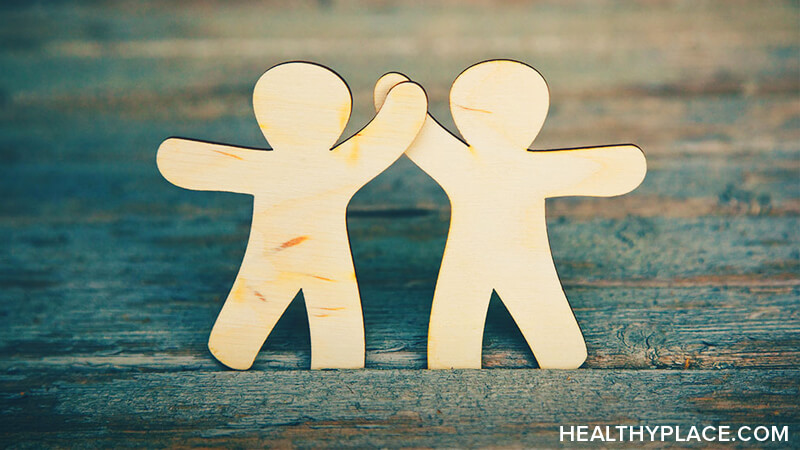How Do You Make Friends with Someone?

How do you make new friends and where do you find them? Find out how to make new friends.
Approaching Someone as a Possible Friend
Many people find it difficult to approach a stranger or someone they know very little about and begin getting acquainted process. It's easier to do this in some situations than others. Being in a class, working with someone, being in a club, being at a party or living in a dormitory or an apartment complex can put people in face-to-face contact on a regular basis. Many of these situations will provide the participants with an indirect way of getting acquainted. For instance, in a club, the participants get to know each other through mutual participation in a club activity.
Whatever the situation, one must still make that opening line, the "hello" and following sentence. Often the opener is most helpful and effective when it is directed at something common in the situation the two of you are in. For instance, your opener might focus on a book that the other person you want to meet is carrying or something about them like an insignia on their clothes or the fact that you are both interested in the same club. Or you might focus on the fact that you have the same hobby or that you both know a mutual friend. Focusing on these elements common to both of you can be more effective than asking for the time or commenting about the weather. It is important, however, to get beyond them to a common topic of interest.
Ask Open-Ended Questions
Attempt to avoid getting mired and trading vital statistics about one another, such as: "Are you married?","Do you have any children", "How long have you lived in this town?" One good way of getting beyond this type of questioning is to ask open questions as opposed to closed or narrow questions. Open questions, in general, demand more than a one or two word answer. Notice how much more information is required to answer a more open question than a closed one. "What do you intend to do with your political science degree?" cannot be answered easily with a single word or two. "Tell me something about what you do," requires a longer answer than, "Do you like your job?" The open question demands a longer response that gives you more information you can react to and develop conversations about.
Ask Questions Specific to the Person
Also attempt to ask questions specific to the person rather than general questions. It's better to say, "I noticed that when we talked about the situation with the President in class today, that you seemed to have a lot to say. How did you develop such a strong opinion?" that to say, "People sure have strong ideas about politicians, don't they?" Give people opportunities to share personal information and feeling by the nature of you questions. Similarly, share free and unsolicited information about yourself by expanding on an answer to what might have been a yes or no question. Give the person that's trying to get to know you more than they are asking for, more than their questions demand, without ending up spending the whole time talking just about yourself. What you hope to accomplish by these tactics is that you might find some mutual areas of interest and things you might have in common with the other person.
If the person you want to get to know gives signs that they want to continue the conversation, then, by all means, continue it, but be attentive to cues of disinterest or hesitation. Don't rush a relationship. If it does not seem to be developing smoothly at the moment, let it slide and return to it at a later time to reopen it.
People get to know one another through a mutual process of self-disclosure that takes place over time. In this process, they share information about themselves, and, at different points of this sharing process, each decides whether they want to continue sharing to deepen their relationship. You or they might decide that you want to maintain a relationship at an acquaintance level or deepen it further into a friendship or even an intimate one.
The process is a gradual one. It is important not to rush it and yet not neglect it either. It is best to convey to the person that you feel positive about the relationship if that is the way you feel about it. If you feel ambiguous about how the other person is responding to the relationship, it is best to give the person the benefit of the doubt about their interest and not to just assume they don't want a relationship of any kind with you. Obviously, this sometimes feels risky.
Risks and Rewards of Getting to Know Someone
Getting to know someone does mean risk, because rejection is always possible. Rejection, however, is much less harmful if you are prepared to understand rejection as not meaning that you are disliked or unlikable. The reasons we usually reject opening a new relationship is not because someone is not likable. It is usually because we already have a social network or established body of friends who meet our needs or that we can't see any mutuality of interest between ourselves and the new person. Making friends and developing a social network is a process of shaking out and identifying a group of people who are somewhat similar to yourself.
This means that some of the new people you meet are not going to be like you and are not going to want to continue the relationship with you --nor you with them. Some are not going to "fit" with you, as you are not going to "fit" with them. If you would look at your actual experiences, you would probably see that you are actually disliked by very few people. You might have been indifferent about a lot of people while really liking a relatively few. Rejection is a two way street; we all reject and we all accept. Even if a given relationship you attempt does not work out, you can learn a lot about people and yourself in the process of trying to make it work that might help you as you pursue new relationships.
Maintenance of Friendships
Getting to know another person is often difficult and doesn't happen as quickly or as smoothly as we'd like. (However, once you have connected and developed a friendship, having someone with whom you can share interests and feelings can make all the effort worthwhile.) Just remember, however, that having a friendship is like growing a garden. Each needs attention and nurturing in order to produce the best results. You can't expect much from a garden that you let go to weeds through lack of attention.
Different relationships may also need different levels of attention. Some may need an occasional "checking in," while others need some daily attention. Know how much you are willing to invest in a friendship. Don't promise more than you are willing to do and set limits when you are being asked for more than you are willing to give. Relationships built on a sense of guilt are difficult to maintain and generally aren't a lot of fun. Try to build your relationships on things that you mutually enjoy.
A Final Note
The last thing to be reminded of, perhaps, is that everyone has trouble establishing relationships from time to time and that not even the most successful people are successful every time. However, nobody is successful unless they try.
Note: This document is based on an audio tape script developed by the University of Texas, Austin. With their permission, it was revised and edited into its current form by the staff of the University of Florida Counseling Center.
APA Reference
Staff, H.
(2021, December 28). How Do You Make Friends with Someone?, HealthyPlace. Retrieved
on 2025, November 27 from https://www.healthyplace.com/relationships/building-friendships/how-do-you-make-friends-with-someone


